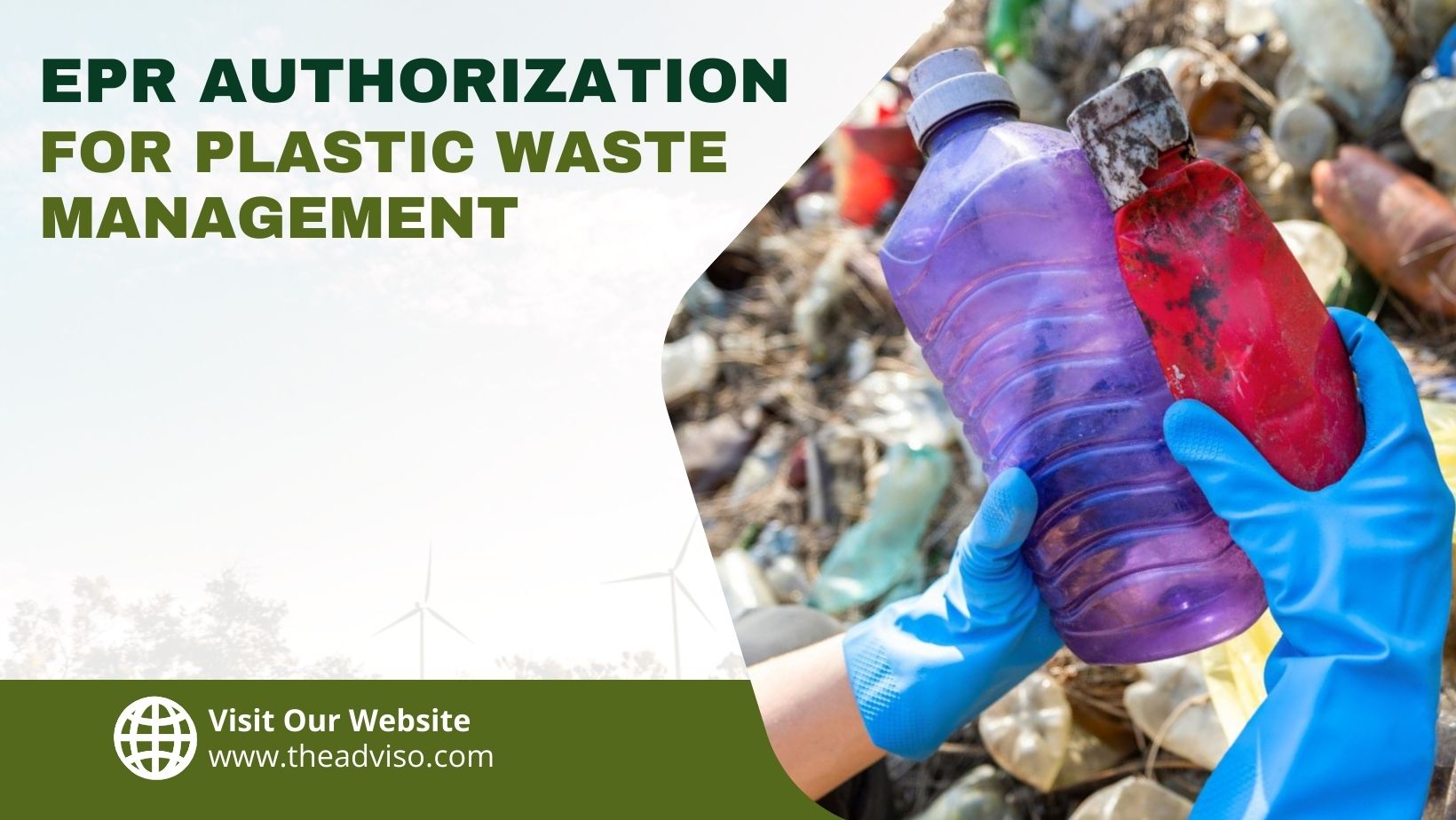EPR Authorization for Plastic Waste Management
Over the years, the use of plastic has grown expansively, leading to serious concerns about the safety of the environment. With millions of tonnes of plastic waste being disposed of into the ecosystem every year, the problem of plastic pollution has ballooned into a global threat.
This has led to governments across the world implementing stricter regulations regarding the disposal of plastic waste. With approximately 2500 tons of waste being generated daily, India too has enforced Producer Responsibility (EPR) to ensure safer disposal of plastic waste and to ensure that such disposal does not harm the delicate ecosystem of nature. So, we at Adviso, have compiled a brief guide to help you gain a better understanding of EPR Authorization for plastic waste management in India.
What is Extended Producer Responsibility?
Extended Producer Responsibility or EPR is an environmental policy primarily focusing on the management and safe disposal of hazardous substances. The EPR guidelines ensure that the producers of environmentally toxic substances are vested with the responsibility of safely disposing of such products once they cease to be useable. This is an extension of the general responsibility of a producer towards their customer to a post-consumer stage, wherein they are supposed to ensure the safe disposal of hazardous products in an environment-friendly manner.
As per the EPR scheme, the producers are mandatorily obligated to take back their product once its useful life cycle ends and recycle or safely dispose of it instead of leaving this responsibility with the consumer or local authorities. It also means that producers are encouraged to establish their own disposal mechanisms to ensure that their products are collected and recycled and in certain cases are even made to contribute to the costs for the recycling or safe disposal of their products.
What are the EPR Rules for Plastic Waste?
Currently, the producers of plastic waste are regulated by the Plastic Waste (Management) Rules, 2016 under the Environment (Protection) Act, 1986 which was implemented by the Ministry of Environment, Forestry and Climate Change. The rules were enacted in an attempt to counter the growing criticism for nations to take a firmer stance on the burning issue of plastic pollution in India. It makes it mandatory for producers of plastic waste to obtain an EPR Authorisation from the Central Pollution Control Board (CPCB) and ensure proper and environment-friendly disposal of plastic waste at the end of their utility cycle.
What are the Benefits of EPR Registration for Plastic Waste Management?
While the EPR Authorization for Plastic Waste Management is a mandatory legal obligation, it also brings with it various benefits such as –
- Positive Environmental Impact – EPR Authorization for plastic waste management improves the management and disposal of plastic waste by producers in India. This helps reduce the massive amount of plastic waste that is buried or burned which leads to serious consequences on the environment. The safe disposal of such plastic waste ensures that human health remains a priority at all times.
- Aids in Sustainable Development – EPR Certificate for plastic waste management also helps in promoting the conservation of natural resources and brings us closer to achieving the Sustainable Development Goals (SDGs). This helps us ensure a better, cleaner, and safer future for the next generation.
- Cost Efficiency – Establishing optimized systems of plastic waste management can allow producers to reduce waste, improve operational efficiency, and also discover new revenue streams by recycling and reducing plastic products, leading to an overall reduction in the costs of production and a considerable increase in overall savings.
- Positive Brand Image – With an increased consumer base that is conscious of the environment, the implementation of EPR guidelines will help boost the brand image and increase customer loyalty.
- Promotes Reuse of Products – EPR for plastic waste management also streamlines the process of collection and recycling of the product, helping cut down the amount of resources used. It also facilitates the reduction of plastic products by encouraging consumers to reuse the same.
To Whom Does the EPR Authorization Apply?
The EPR rules apply to the following entities –
- Producers
- Importer
- Brand Owner
- Plastic Waste Processors that are engaged in (1) Recycling (2) Converting Waste to Energy (3) Converting Waste to Oil (4) Industrial Composting
Further, as per the Plastic Waste (Management) Rules, 2016, Producers of plastic can be categorized into the following ways –
- Category I – Packaging made of rigid plastic
- Category II – Multilayer flexible plastic packaging such as carry bags, sachets, or pouches.
- Category III – Containers made of plastic layers of at least one layer of plastic and one layer made of material that is not plastic.
- Category IV – Plastic sheets for packaging as well as compostable plastic bags.
What are the Responsibilities of Producers of Plastic Waste under EPR?
The producers of plastic have the following EPR obligations according to the Plastic Waste (Management) Rules, 2016 –
- The producers are imposed with an extended obligation to recycle or reuse the plastic products that they sell in the market.
- They also have to meet the collection and recycling or refurbishing targets as specified in Schedule II of the Rules.
- The producers have to provide the annual EPR action plan to the Central Pollution Control Board (CPCB) for the amount of plastic manufactured in the previous financial year.
- The producers are also mandated to furnish the half-yearly progress reports regarding the management of plastic waste to fulfill the EPR targets to the CPCB and the concerned State Pollution Control Boards of the respective states in which they operate within 15 days of the completion of the corresponding half-year terms.
- The producers are also mandated to furnish the annual return vide Form-3 regarding the plastic waste collected and recycled or reused to fulfill the EPR targets to the CPCB and the concerned State Pollution Control Boards of the respective states in which they operate by 30th June of the next financial year.
What is the Process of Obtaining EPR Authorization for Plastic Waste Management?
The producers have to follow the following steps to successfully obtain the registration –
- Log into the online EPR portal and initiate the registration process.
- Fill in the relevant information as required in the E-form such as details of the factory, know your customer, etc.
- Provide all the requisite documents as specified by CPCB.
- Pay the requisite fees and submit the application.
How is the Application Processed?
Once the application is submitted, it is processed by the CPCB as follows –
- The application shall be submitted within 15 working days, after which the registration shall either be approved or rejected.
- If the application is found to be incomplete during the processing, the applicant shall be informed about the same and be given time for rectification.
- If the authority finds any false or incorrect information, the application shall be rejected and the application fee shall be deemed to be forfeited.
- The Portal has a provision for the internal processing of applications within the CPCB, wherein the Member Secretary of the CPCB shall act as the Issuing Authority for the Certificate.
- Portal-generated Registration certificate with a seal and sign of the Competent Authority shall be uploaded on the Portal within 7 days.
- Copy of the Registration along with the EPR Action Plan shall be shared with the concerned SPCB/PCCs and the Nodal Agency designated by the State Government/ UT Administrator.
- Fresh registration is granted for a period of 1 year while subsequent registration is valid for a period of 3 years from the date of grant of Registration.
What are the Documents Required for PLASTIC EPR Registration?
The documents required for plastic producers vary according to their classification. They are as follows –
- Holistic EPR Plan as per the guidelines specified by CPCB or SPCB
- Copy of agreements with the plastic waste processing and recycling agencies
- Declaration as per the format provided in the guidelines including a declaration for compliance with Reduction of Hazardous Substances (ROHS) rules.
- Technical documents such as half-yearly reports and implementation status of the EPR Action plan.
- Taxpayer Identification Number (TIN) and Corporate Identification Number (CIN)
- The Aadhar Card of the authorized person and PAN card of the Company involved in the Business
- Valid Consent Certificate from Water and Air Board
- Valid Consent Certificate from Hazardous Wastes Authorisation
- Proof of Ownership of the Business
- Factory/ Trade License and District Industries Certificate, if the unit is registered.
- Import Export Certificate in case of importers
- Self-attested copy of the GST Certificate of the Company
What is the Fee for EPR Registration for Plastic Waste?
The Government fee for the EPR Authorisation for plastic producers is based on the annual plastic waste generation capacity of the company in Tonnes Per Annum (TPA) and is classified as follows –
- Fee for Plastic Producers or brand owners (PIBOs)
| Annual Plastic Waste Generation | EPR Authorisation Fee |
| < 1000 TPA | Rs. 10,000 |
| 1000 – 10000 TPA | Rs. 20,000 |
| > 10000 TPA | Rs. 50,000 |
- Fee for Plastic Waste Processors (PWPs)
| Annual Plastic Waste Production | EPR Authorisation Fee |
| < 200 TPA | Rs. 5,000 |
| 200 – 2000 TPA | Rs. 20,000 |
| > 2000 TPA | Rs. 50,000 |
Further, an Annual Processing Fee of 25% of the Application Fees is charged.
Can the EPR Registration be Cancelled or Suspended?
Once the EPR registration is granted to plastic producers, it is also liable to be canceled or suspended by the CPCB along with the imposition of an adequate environmental compensation levy based on the following reasons –
- Failure to comply with the EPR obligations, targets, and guidelines based on which the registration was granted by the CPCB.
- If the documents submitted by the producer are found to be fraudulent, incorrect, or misrepresented.
- If the EPR Authorisation holders deal with any unauthorized or unregistered entities.
However, in case of cancellation or suspension of the EPR registration, an opportunity will be given to hear the producer within 15 days from the issuance of notice of cancellation or suspension. Further, the decision will be communicated within 10 days from the hearing and the aggrieved producer may also file an appeal with the Chairman of CPCB who shall be the final Authority for deciding the cancellation or suspension of the EPR Authorisation.
What is the Process of Renewal of EPR Authorization for Plastic Waste?
Once the EPR registration expires, the PIBOs have to file an application to renew the same in the EPR portal 4 months prior to the date of expiry. The renewal fee is the same as the registration fee. The Annual Processing Charges shall be 25% of the EPR application fee. The following documents have to be submitted for the renewal of the EPR authorization of plastic waste management –
- Application for Renewal
- Copy of the Original Registration Certificate
- EPR Action Plan
However, the application will only be processed if all the half-yearly reports have been duly filed by the producer and will be based on the compliance status as received from the concerned SPCB. The registration shall be renewed for a term of up to three years within 15 days from the receipt of complete documents.
Why Adviso?
EPR registration is a mandatory process for producers of plastic products in India and if the producer operates without authorization, the CPCB may impose heavy penalties. However, EPR Registration involves several steps and compliances, which makes it a relatively cumbersome process and also increases the chances of errors.
Adviso comprises a dedicated team of experienced professionals who can help you obtain your EPR registration seamlessly on a minimal budget. Our team ensures that all your documentary and legal compliances are met efficiently so that you can focus on building your business.
Drop us a message and our team will be delighted to discuss your requirements and help you resolve all your queries.
Conclusion
With millions of tonnes of plastic waste being dumped every day, there has been a severe rise in the accumulation of hazardous plastic pollution. The improper disposal of such plastic waste is beginning to have serious consequences for the global environment. This has encouraged several nations to enact mandatory measures and EPR authorization for safe disposal and proper management of plastic waste.
Considering the negative effects plastic pollution can have on the environment, mandatory EPR Authorization is a noble attempt to facilitate safer and more efficient management of the massive amounts of plastic waste generated on a daily basis. Considering that the compliance process for EPR authorization for plastic waste management can be quite complex and time-consuming, it is best to take the help of professional services like Adviso to ensure that all the compliances are met in time and within a minimal budget.
Read Our Article: Company Registration in Hong Kong




